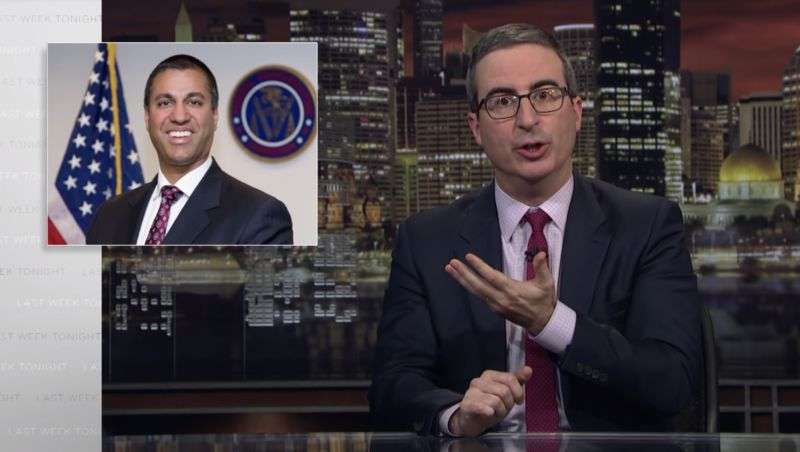
John Oliver fights robocalls… by robocalling Ajit Pai and the FCC

Comedian John Oliver is taking aim at the Federal Communications Commission again, this time demanding action on robocalls while unleashing his own wave of robocalls against FCC commissioners.
In a 17-minute segment yesterday on HBO’s Last Week Tonight, Oliver described the scourge of robocalls and blamed Pai for not doing more to stop them. Oliver ended the segment by announcing that he and his staff are sending robocalls every 90 minutes to all five FCC commissioners.
“Hi FCC, this is John from customer service,” Oliver’s recorded voice says on the call. “Congratulations, you’ve just won a chance to lower robocalls in America today… robocalls are incredibly annoying, and the person who can stop them is you! Talk to you again in 90 minutes—here’s some bagpipe music.”
Pai celebrated FCC court loss in robocall case
Oliver pointed out that Pai opposed Obama-era FCC anti-robocall rules and “was extremely happy when they were overturned.” Oliver was referring to a March 2018 court ruling in which federal judges said a 2015 FCC order improperly treated every American who owns a smartphone as a potential robocaller. Pai praised the court ruling, as we reported at the time.
Pai hasn’t ignored the problem of robocalls. He has publicly criticized carriers that aren’t quickly deploying new Caller ID authentication technology, and he threatened “regulatory intervention” if they fail to do so by the end of this year. Pai’s FCC has also levied big fines against robocallers and expanded carriers’ authority to block robocalls.
Oliver argued that Pai hasn’t done enough. He said that the FCC “could require [carriers] to offer free call-blocking services” and that Pai has, so far, merely urged carriers to adopt Caller ID authentication technology instead of requiring them to do so.
Oliver also referred to an ongoing proceeding in which the FCC may change the definition of auto-dialing. “The thing experts are really worried Pai might do,” Oliver said, “is bow to pressure from groups like telemarketers and banks and draft a new, narrower definition of what constitutes auto-dialing that would basically limit what would count as a robocall.” This would limit consumers’ rights to sue robocallers, Oliver added.
Robocalling the FCC is easy, Oliver says
In May 2017, Oliver urged viewers to file public comments opposing Pai’s plan to kill net neutrality rules. The FCC website promptly crashed, but the FCC claimed the crash was the result of “multiple distributed denial-of-service attacks” and not because of Oliver’s viewers. More than a year later, Pai admitted that the FCC lied about its public comment system being taken down by DDoS attacks, but he blamed his former chief information officer for providing the inaccurate information.
We contacted Pai’s office about Oliver’s latest gambit today, and we will update this story if we get a response.
When it came to robocalling the FCC, Oliver didn’t need viewers’ help. “This time, unlike our past encounters [with the FCC], I don’t need to ask hordes of real people to bombard [the FCC] with messages, because with the miracle of robocalling, I can now do it all by myself,” Oliver said.
“It turns out robocalling is so easy, it only took our tech guy literally 15 minutes to work out how to do it,” Oliver also said. He noted that “phone calls are now so cheap and the technology so widely available that just about everyone has the ability to place a massive number of calls.” (We discussed that problem, with a focus on spoofed Caller ID, in this 2017 feature.)
Under US law, political robocalls to landline telephones are allowed without prior consent from the recipient. Such calls to cell phones require the called party’s prior express consent, but Oliver presumably directed his robocalls to the commissioners’ office phones.
Addressing the FCC commissioners, Oliver said, “if you want to tell us that you don’t consent to be robocalled, that’s absolutely no problem. Just write a certified letter to the address we buried somewhere within the first chapter of Moby Dick that’s currently scrolling up the screen… find the address, write us a letter, and we’ll stop the calls immediately.”




